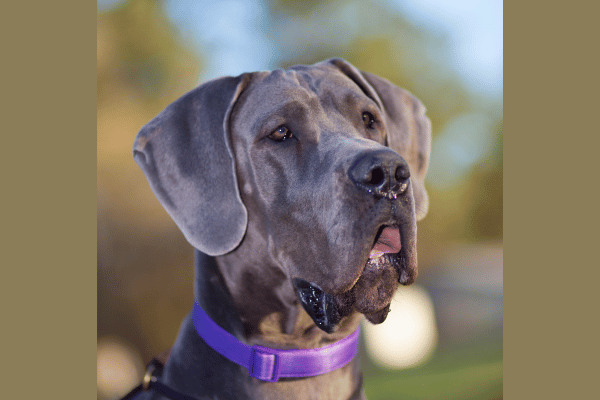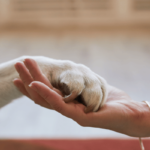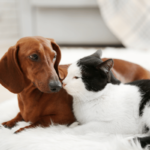Exploring Great Dane Behavior and Care, these gentle giants captivate with their size and temperament. This article delves into their unique needs and characteristics.
Unveiling the Nature of Great Danes
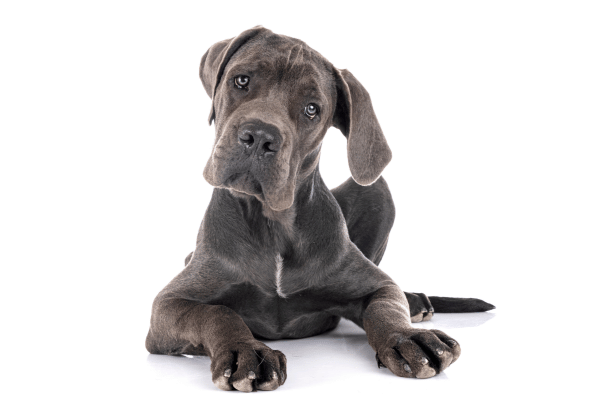
Great Danes, known for their colossal stature, possess a surprisingly gentle demeanor. Despite their intimidating size, these dogs exhibit a calm and friendly nature. They thrive in environments where they can interact and bond with their human companions. Importantly, early socialization and consistent training are crucial. These practices help in nurturing their inherent gentle nature, ensuring they grow into well-adjusted, sociable adults. Their temperament makes them excellent family pets.
Caring for a Great Dane requires understanding their specific needs. Nutritionally, they need a balanced diet tailored to their large size and energy levels. Regular exercise is essential, but it should be moderate to protect their joints. Additionally, due to their size, they are prone to certain health issues like hip dysplasia and bloat. Regular veterinary check-ups and a watchful eye on their health are imperative. Their care demands commitment but is incredibly rewarding.
The lifespan of Great Danes, typically around 7-10 years, is shorter compared to smaller breeds. This fact underscores the importance of cherishing every moment with these gentle giants. Their endearing personality, coupled with their impressive size, makes them unique companions. Owners should be prepared for both the joys and challenges of caring for these dogs. Great Dane Behavior and Care are about understanding and meeting their physical and emotional needs.
Based on the information from the American Kennel Club, Great Danes are a unique breed with specific characteristics and needs. Here’s a continuation of the article focusing on these aspects:
Great Danes: Gentle, Playful, and Adaptable
Great Danes are not just physically imposing; they are also known for their affectionate and playful nature. They form strong bonds with family members and are generally good with children, although supervision is always advised due to their size. These dogs are adaptable, handling changes in living conditions and daily routines well. However, they can be reserved around strangers. Their coat requires minimal grooming, and they are not known for excessive shedding.
Training and mental stimulation are vital for Great Danes. They are eager to please, which makes training relatively straightforward, but they also have a self-willed streak. Consistent, positive reinforcement works best. These dogs need moderate exercise to maintain their health and happiness. They are not excessively vocal, but they will alert their owners to strangers. It’s important to provide them with activities that engage their minds and bodies.
Great Danes have a few health considerations that owners should be aware of. They are prone to conditions like hip dysplasia and bloat, which requires vigilance from the owner. Regular veterinary check-ups are essential to monitor their health. Despite these concerns, with proper care and attention, Great Danes can be wonderful, loving companions. Their unique combination of size, gentleness, and intelligence makes them a remarkable breed for the right owner.
Navigating Great Dane Behavior and Care Challenges
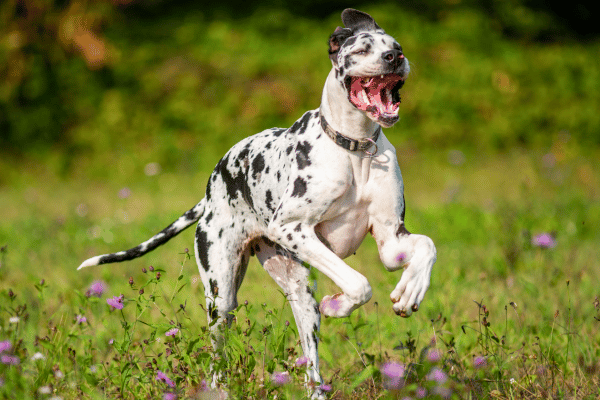
Great Danes, despite their size, are prone to anxiety and stress, especially when left alone for extended periods. This breed craves companionship and thrives in an environment where they can be close to their family. To mitigate anxiety, it’s crucial to establish a routine, provide regular exercise, and create a comforting space for them. Training them from a young age to be comfortable with solitude can also help in managing separation anxiety.
Socialization is key in shaping the behavior of Great Danes. Exposing them to different people, pets, and environments from a young age helps them develop into well-rounded adults. This breed is generally friendly towards other dogs, but early socialization is essential to foster this trait. Positive experiences during their formative years play a significant role in preventing fear-based aggression and ensuring they are well-behaved and confident in various social settings.
Great Dane owners should be mindful of their pet’s nutritional needs. Due to their rapid growth, puppies require a diet that supports healthy bone and joint development. Overfeeding and improper nutrition can lead to health issues like obesity and joint problems. As they age, their dietary needs change, and it’s important to adjust their food intake accordingly. Consulting a veterinarian for dietary advice is recommended to ensure they receive balanced nutrition throughout their life.
Effective Training Techniques for Great Danes
Training a Great Dane requires patience and consistency. Due to their size, it’s crucial to establish control and respect early on. They respond well to positive reinforcement techniques such as treats and praise. Avoid harsh methods, as these can lead to fear and aggression. Focus on basic commands initially, then gradually introduce more complex tasks. Consistent training sessions help in developing their cognitive abilities and strengthen the bond between the dog and the owner.
Exercise is vital for Great Danes, not just for their physical health but also for their mental well-being. They require regular, moderate exercise to prevent boredom and destructive behaviors. Activities like long walks, gentle play sessions, and interactive games are ideal. It’s important to avoid strenuous activities, especially in puppies, as their bones and joints are still developing. Regular exercise helps in maintaining their muscular build and overall health.
Great Danes are known for their loyalty and protective nature. While they are not typically aggressive, they will protect their family if they sense a threat. This protective instinct should be managed through training to ensure they do not become overprotective. Teaching them to differentiate between normal and threatening situations is crucial. A well-trained Great Dane is a confident and secure companion, capable of discerning when to be protective and when to be calm.
Healthcare Essentials for Great Dane Well-being
Great Danes require attentive healthcare throughout their lives. Regular veterinary check-ups are crucial to monitor for common health issues like heart conditions, hip dysplasia, and bloat, a serious condition requiring immediate attention. Preventative care, including vaccinations and parasite control, is essential. Owners should also be aware of signs of joint issues, particularly as Great Danes age. Early detection and treatment can significantly improve their quality of life and help manage potential health problems effectively.
Dental care is often overlooked but is vital for Great Danes. Regular teeth cleaning, either at home or professionally, helps prevent dental diseases, which can affect their overall health. Additionally, paying attention to their nails, ears, and coat is important. Regular grooming not only keeps them looking their best but also allows owners to check for any skin issues or parasites. A well-groomed Great Dane is a healthier and happier dog.
Emotional well-being is as important as physical health for Great Danes. They are sensitive and thrive on companionship and affection. Ensuring they have a supportive and loving environment is key. Providing mental stimulation through toys, puzzles, and training exercises helps keep their minds active. Regular interaction and playtime strengthen the bond between the dog and its family. A happy Great Dane is one that feels loved, secure, and mentally stimulated.
Creating a Comfortable Home for Great Danes
Great Danes, despite their size, are often referred to as ‘gentle giants’ and are known for their love of comfort. Creating a suitable living space is essential. This includes a large, comfortable bed to support their size and weight, and ample room to move around. Their living area should be safe and free from hazards. Since they are prone to joint issues, avoid slippery floors and provide soft bedding to cushion their joints.
The living environment for a Great Dane should also consider their emotional needs. They prefer being around their human family and can experience anxiety if isolated. Designate a space in common areas where they can relax yet still feel part of the family activities. Providing toys and engaging in interactive play can help keep them entertained. Remember, a bored Great Dane can become destructive, so mental stimulation is as important as physical comfort.
Temperature regulation is important for Great Danes. They do not fare well in extreme temperatures, so ensure their environment is comfortably cool in summer and warm in winter. Proper ventilation and access to clean water are essential, especially during hot weather. In colder months, they may need extra bedding or even a doggy sweater. Paying attention to these details ensures your Great Dane stays comfortable and healthy throughout the year.
Bonding and Building Trust with Great Danes
Building a strong bond with a Great Dane is crucial for their emotional well-being. These dogs are known for their loyalty and affection towards their owners. Spend quality time with them daily through activities like walks, playtime, and training sessions. Consistent, gentle handling and positive reinforcement help in building trust. Great Danes are sensitive to their owner’s emotions and respond well to calm and confident leadership, strengthening the bond between pet and owner.
Understanding and respecting a Great Dane’s personality is key to a harmonious relationship. They are intelligent and can be quite intuitive, often picking up on subtle cues from their owners. Engaging in activities that stimulate their minds, such as obedience training or agility exercises, can be highly rewarding for them. Remember, every Great Dane is an individual with unique preferences and quirks, and recognizing these will enhance the connection you share.
Great Danes, with their imposing stature, can be intimidating to some, but they are typically gentle and friendly. Introducing them to a variety of people and situations helps them become well-socialized and confident. Regular social interactions can prevent them from becoming overly protective or shy. Encouraging gentle play and positive experiences with others, both humans and animals, fosters their natural affability and ensures they are well-adjusted, sociable members of the family.
Great Dane Behavior and Care: Final Thoughts
Great Danes are more than just their size; they are creatures of heart and grace. Owners should remember that despite their large physique, these dogs are sensitive and responsive to their environment. Creating a nurturing space, both physically and emotionally, is key to their well-being. Regular health check-ups, a balanced diet, and adequate exercise are fundamental. But equally important is the love and attention they receive from their family, shaping their gentle demeanor.
The journey with a Great Dane is filled with learning and love. These dogs bring immense joy and companionship, but they also require commitment and responsibility. Understanding their specific needs in terms of health, nutrition, exercise, and emotional support is crucial. Great Danes are not just pets; they become integral members of the family. Their presence is commanding, yet their nature is tender, making every moment with them a unique and rewarding experience.
In conclusion, Great Dane Behavior and Care are about balancing their physical needs with emotional nurturing. They offer unconditional love and loyalty, and in return, they deserve the best care we can provide. For those considering a Great Dane, be prepared for a rewarding journey filled with affection, challenges, and growth. These gentle giants will not only occupy space in your home but will forever leave a lasting imprint on your heart.
Preparing for a Great Dane’s Senior Years
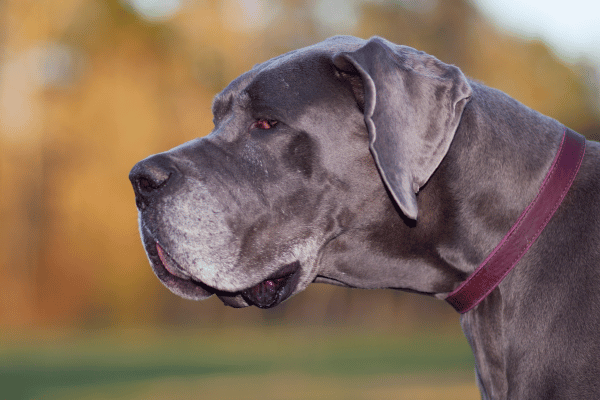
As Great Danes enter their senior years, their care needs evolve. They may become less active and require adjustments in diet and exercise. It’s important to monitor their weight to prevent obesity, which can exacerbate joint issues. Senior Great Danes may also face age-related health challenges such as decreased mobility or hearing and vision loss. Regular veterinary check-ups become even more crucial to manage these changes and maintain their quality of life.
Adapting your home for a senior Great Dane can make their life more comfortable. Consider providing ramps or steps to help them access furniture or vehicles, as jumping can be difficult. Orthopedic beds can offer better support for their joints. Be patient and gentle with them as they navigate these changes. Understanding and accommodating their aging process with love and care can significantly enhance their comfort and happiness in their golden years.
Emotionally, senior Great Danes may require more attention and reassurance. They might become more clingy or require more time to rest. Continue to engage them in gentle play and short walks to keep them mentally stimulated. It’s also important to recognize and respect their limits. Cherishing and caring for a Great Dane in their senior years can be a deeply rewarding experience, offering a special time of companionship and mutual affection.
Celebrating the Unique Joy of Great Danes
Owning a Great Dane brings a unique blend of challenges and joys. Their impressive size and gentle nature make them standout companions. Celebrating their milestones, from playful puppyhood to dignified senior years, creates lasting memories. Owners should embrace every stage of their Great Dane’s life, understanding that each phase has its own beauty and challenges. These dogs not only bring joy and laughter into a home but also teach invaluable lessons about care, empathy, and unconditional love.
The bond between a Great Dane and their owner is profound. These dogs have a way of sensing emotions and providing comfort. They are not just pets; they become loyal friends and family members. Their presence can fill a home with love and warmth. The commitment to their well-being, in turn, fosters a deep connection that enriches the lives of those who care for them, making every day with a Great Dane special.
In summary, Great Danes are remarkable animals that require dedicated care and attention. They reward their owners with loyalty, affection, and an incomparable companionship. The journey of caring for a Great Dane is filled with learning, love, and laughter. It’s a path that requires patience, understanding, and a big heart. For those willing to embark on this journey, the experience of having a Great Dane in your life is truly unparalleled.
Concluding Thoughts: The Rewarding Path of Great Dane Companionship
In conclusion, embracing the journey of Great Dane ownership is a rewarding experience filled with love, challenges, and growth. These gentle giants, with their unique blend of size and tenderness, bring immense joy and companionship. They require dedicated care, understanding their specific needs in health, nutrition, and emotional well-being. As owners, we have the privilege and responsibility to provide them with a loving and nurturing environment, ensuring their happiness and health throughout their lives.
The bond shared with a Great Dane is one of mutual respect and affection. They are not just pets; they become integral members of the family, offering unconditional love and loyalty. This journey, while demanding, is incredibly fulfilling. It teaches us patience, empathy, and the importance of nurturing relationships. Great Danes have a special way of leaving paw prints on our hearts, making every moment spent with them precious and unforgettable.
We encourage our readers to cherish every moment with their Great Danes, embracing both the joys and challenges. Share your experiences, learn from others, and continue to grow in your journey with these magnificent dogs. If you’re considering a Great Dane, prepare for a life-changing companionship. For more insights and tips on Great Dane care, visit our blog and join our community of passionate Great Dane owners. Your comments and stories are always welcome!
Reference Used: American Kennel Club
I. Frequently Asked Questions About Dog and Cat Breeds
- What breed of dog gets along best with cats?Golden Retrievers are known for their friendly and tolerant attitudes, making them one of the dog breeds that get along best with cats.
- Which cat breed gets along best with dogs?The Maine Coon is known for its sociable, relaxed nature, and tends to get along well with dogs.
- Can any dog get along with a cat?While individual personalities vary, many dogs can get along with cats, especially if they are socialized properly from a young age.
- Can a dog and a cat breed together?No, dogs and cats cannot breed together due to significant biological differences.
- What breed of dog and cat get along?Labrador Retrievers and Ragdoll cats are known for their gentle dispositions, making them a good match for cohabitation.
- Can you breed a dog and a cat?It is biologically impossible to breed a dog and a cat due to their different species.
- Which dog breed is most like a cat?The Basenji dog breed is often compared to cats due to their grooming habits and independent nature.
- What dog breeds can live with cats?Basset Hounds, Beagles, and Pugs are among the dog breeds known to coexist peacefully with cats.
- How many dog breeds are there in the world?There are over 340 recognized dog breeds worldwide.
- How many cat breeds are there in the world?The International Cat Association recognizes about 71 cat breeds.

Join Dan Morgan at dwfocus.com, your hub for ‘4 paws and owners’ wisdom! Explore a world where pet care meets expert insights, crafted by Dan, a seasoned vet with a heart for animals. Engage with stories, tips, and advice that every pet owner needs. From playful pups to graceful cats, Dan Morgan guides you through the joys and challenges of pet parenting. Embrace your love for pets with Dan’s expert guidance on dwfocus.com. #4PawsAndOwners #DanMorganPetExpert #dwfocus

